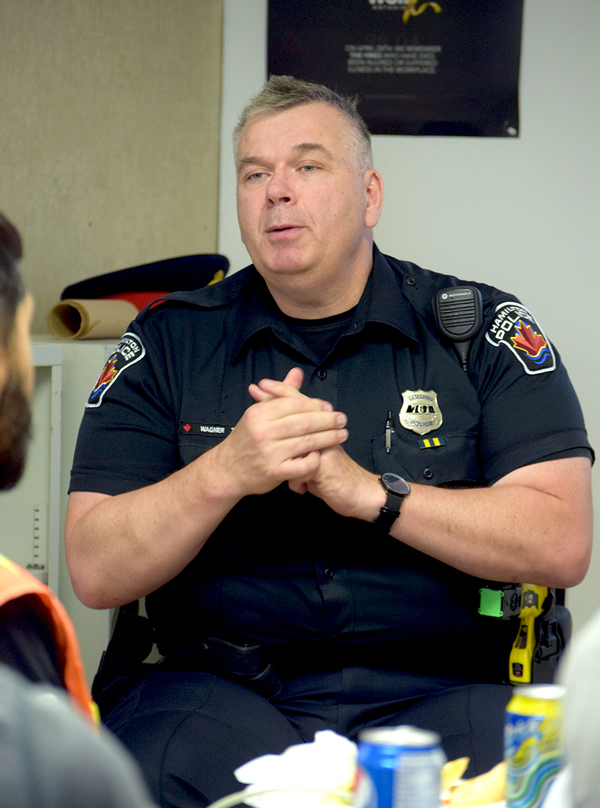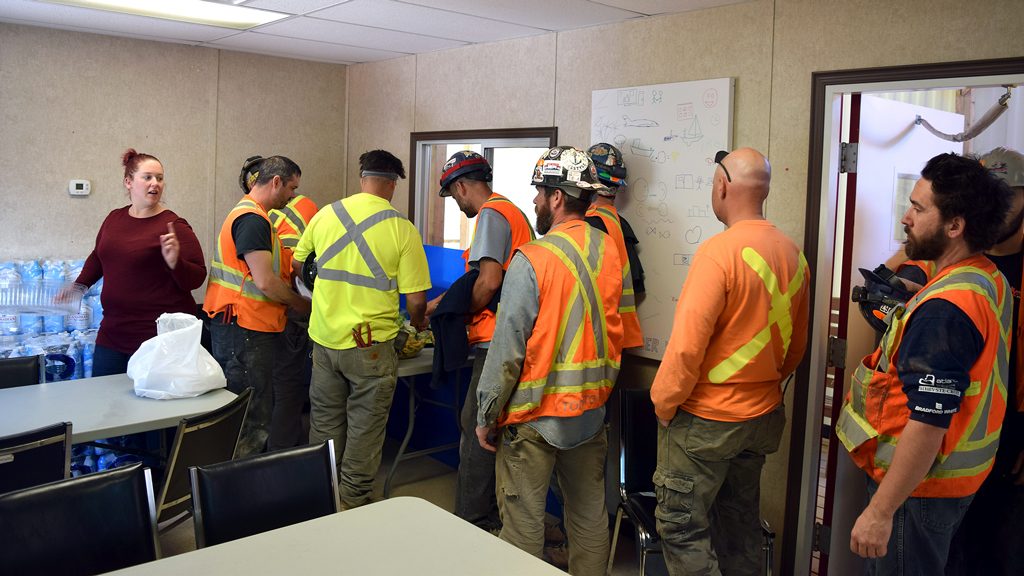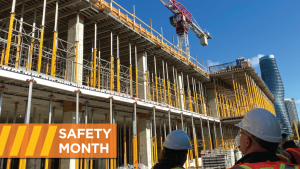Steamfitters and plumbers working for Alberici Constructors on the firm’s $174-million refurbishing job at the Humber Wastewater Treatment Plant in Toronto had already put in five hours on the job when they were called in to a Lunch and Learn session late morning on May 8 as part of Safety Week in Ontario.
Alberici office manager Amanda McQuillin said workers were taking WHMIS refreshers, learning about the Ontario General Contractors Association Safety Pass program and revisiting working at heights training during the week, and this day was devoted to a new set of health and safety messages – how the legalization of cannabis will affect the workplace and beyond that daily living.
Hamilton Police constable Claus Wagner spoke as some 22 workers lunched inside the Alberici projects trailer. The officer predicted nothing less than an “explosion” of fatalities across the country on roadways as a wave of new users take up today’s potent recreational marijuana, and said to keep safe construction workers will have to be vigilant in looking after each other.
“You guys as workers together will have to have health conversations with people you work with,” said Wagner, a veteran drug recognition expert with the Hamilton force. “Nobody wants to see anybody get hurt, nobody wants to see anybody get fired. This is about keeping everybody safe, because this is going to be an explosion if it goes July 1. Every state that has brought this in, there has been an explosion of fatalities on the road and impaired drivers.”
Wagner told the workers there is uncertainty about whether the federal Liberal government will keep its implementation target date of July 1.
In an interview, the officer said the legalization of recreational cannabis could have the same effect as the lifting of Prohibition, with new users not realizing marijuana potency has risen from seven or eight per cent decades ago to 27 to 40 per cent today. Edibles will bring even higher risk, he said – new users will try a gummy bear, for example, not feel any effects over 20 minutes and take another one.
“The problem is it kicks in when you are at work,” Wagner said.

“So now it carries into the workplace. God forbid a family may lose a loved one. Health services are being taxed, workers compensation is being taxed, taxpayers are paying, it is the ripple effect.
“Now the worksite loses a valuable employee, he may have been trained for 15 years, so now the company has been affected.”
Wagner said the main goal of his lectures to workers at construction companies such as Dufferin, King and now Alberici is to get accurate information out so workers can make good decisions in their lives and in the workplace.
“At the end of the day that is what we want, for them to be safe and working,” he said.
Wagner said it was likely the new standard for combined alcohol and cannabis use that could lead to the provincial offence of impaired driving – as opposed to federal criminal charges that arise when the blood alcohol level is above .08 – would be .05 per cent alcohol in the blood and two nanograms of THC.
“If you smoke a regular marijuana cigarette, you are probably pretty close to two nanograms,” Wagner said.
The public seems to think policing is a dangerous job but last year there were only three police fatalities across Canada while there are often that many electrical workers killed in a month, said Wagner – thus the recommendation that workers look out for each other on the job in the new era of legal cannabis.
“Be a friend, you have to be able to be strong enough to say to a fellow employee, you gotta go home, or get some help,” he said.
As employers and fellow workers look to determine if an employee is not fit for work, they may find it valuable to learn the signs police officers use as part of a Standardized Field Sobriety Test, said Wagner. Impairment from cannabis can be different than alcohol, he pointed out. For example, eyes are redder with cannabis impairment, and react differently in a horizontal gaze test.
“Would you want to be the signaller behind the dump truck if the dump truck driver is high?” he asked.











Recent Comments
comments for this post are closed